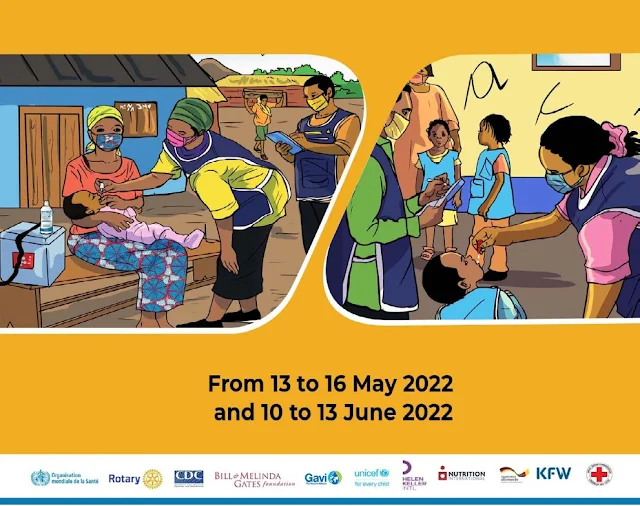The Government of Cameroon
is organizing two rounds of vaccination campaign in response to the polio
epidemic from May 13 to 16 and June 10 to 13, 2022, all over the national
territory.
This campaign follows the
confirmation of cases of circulating derived poliovirus type 2 (cVDPV2) in a
dozen of African countries including Cameroon. The campaign will be conducted
in a synchronized manner with the Central African Republic, the Democratic Republic
of Congo, Chad and Niger.
Vaccination will take
place in health facilities, in households through the door-to- door strategy
and also in public places such as schools, markets, chiefdoms and religious
gathering.
During this period,
vaccination teams will administer two drops of oral polio vaccine to children
aged 0 to 5 years, vitamin A to children aged 6 months to 5 years, and worm
medicine to children 1 to 5 years. In addition, children aged 0 to 3 months
without a birth certificate will be counted and their parents guided to a civil
status registration.
As a prelude to the
vaccination, Social Mobilizers will visit households to inform and sensitize
parents on the importance of the various interventions.
The Minister of Public
Health therefore invites parents and the entire community to have their
children vaccinated and to respect their vaccination calendar.
Together, let’s mobilize for the health and well-being of our
children!
AIM OF THE CAMPAIGN
The aim of this campaign
is to strengthen herd immunity in children under five (05) years of age against
circulating poliovirus derivative type 2 by administering the Oral Polio
Vaccine type 2 to all children in this age group to thereby stop the
circulation.
OBJECTIVES OF THE CAMPAIGN
• Vaccinate 100% of
children under 5 years.
• Ensure that at least 95%
of parents are effectively informed about polio and the response campaigns
before the vaccinators come.
• Active search and
reporting of cases of acute flaccid paralysis in the community;
• Ensure efficient vaccine
management by returning 100% of nVPO2 vials at the end of the campaign; Vitamin
A supplementation for children aged 6 months to
5 years.
• Deworming of children
aged 12 months to 5 years.
• Conduct a count of
children aged 0-3 months without a birth certificate and refer them for civil
registration
PERIOD AND DURATION OF THE CAMPAIGN
The first round will run
from 13 to 16 May 2022 and the second from 10 to 13 June 2022.
LOCALITIES CONCERNED BY THE CAMPAIGN
All the 197 Health
Districts in all ten Regions.
WHAT IS POLIO?
It is a highly contagious
viral disease caused by the poliovirus. This virus is transmitted through
contaminated water or food or contact with an infected person. Children under 5
years are the most affected. The poliovirus causes irreversible paralysis of
the limbs. The paralyzed child becomes a burden to his or her family,
community, and country.
WHO IS MORE LIKELY
TO GET POLIO?
The polio virus usually
affects children under 5 years of age who are not immunized. It can also affect
unvaccinated adolescents and adults
HOW IS POLIO TRANSMITTED?
The polio virus infects
the body through the mouth while eating contaminated food or drinking water
contaminated with the stool of a person carrying the poliovirus
HOW IMPORTANT IS
POLIO VACCINATION?
Vaccination is the best
way to prevent polio. It is highly effective in protecting the child.
The vaccine to be used in
this campaign is the new oral polio vaccine type 2 (nOPV2). This vaccine is
most appropriate for responding to outbreaks of circulating poliovirus-derived
type 2.
It is safe to give
multiple injections of vaccines in one session.
IS THERE A TREATMENT
FOR POLIO PARALYSIS?
No, paralysis is
irreversible. It can however be prevented by vaccination.
WHAT SHOULD YOU DO
TO AVOID POLIO?
It is necessary to:
• Vaccinate all children in mass campaigns and
during routine immunization to boost individual and group immunity;
• Observe the following hygiene measures:
• Wash hands regularly with clean running
water and soap/ash;
• Boil non-portable water before consumption
or use another method of water treatment;
• Wash fruits and vegetables with clean water
before eating;
• Defecate in latrines or toilets
• Do not swim in standing water;
Report any case of sudden
paralysis to the nearest health facility.
WHAT IS ORAL POLIO
VACCINE (OPV)?
OPV is one of the
presentations of the polio vaccine. It is given orally in health centres as two
drops of vaccine at birth, at 1.5 months, at 2.5 months and at 3.5 months. The
vaccine is also used in mass vaccination campaigns for children aged 0-5 years.
WHAT IS INACTIVATED
POLIO VACCINE (IPV)?
IPV is the alternative
presentation of the polio vaccine. It is administered to infants aged 3.5
months in health centres and other sites identified by health staff. The
administration of OPV and IPV is used to strengthen polio control. Hence the
formula:
OPV + IPV = «Strengthening
Polio Control.
WHAT TO DO AFTER A
CHILD HAS AN ADVERSE REACTION TO VACCINATION?
Adverse reactions after a
vaccine are normal and temporal. However, if they persist, the child should be
taken to the nearest health centre.
«PREVENTION IS BETTER THAN CURE »
Vaccination is the most
effective way to protect children from vaccine-preventable diseases. To ensure
that the child is fully protected from birth, the appointments set out in the immunization
schedule from 0 to 23 months of age must be respected.





Comments